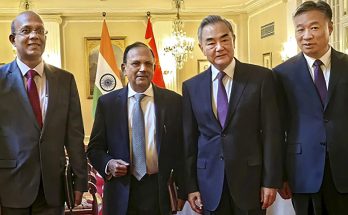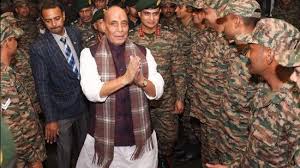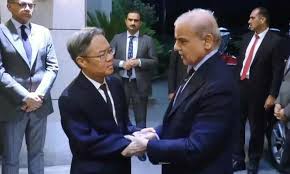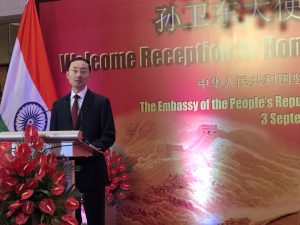
Setting a positive tone ahead of the second informal summit meeting between the leaders of India and China, China’s new Ambassador to India Sun Weidong has exhorted the two countries to take a big-picture view of this crucial bilateral partnership and “properly handle differences” through a rational dialogue.
The envoy’s positive messaging amid speculation about some recent differences signals Beijing’s intent to keep the relationship with India on an even keel by focusing on widening the arc of win-win cooperation between Asia’s leading economies.
The envoy’s positive messaging amid speculation about some recent differences signals Beijing’s intent to keep the relationship with India on an even keel by focusing on widening the arc of win-win cooperation between Asia’s leading economies.
Win-Win cooperation
Alluding to the simultaneous rise of India and China on the world stage, the Chinese envoy envisaged an affinity between China’s striving to achieve its “two centenary goals” and the project of building a new India, as unveiled by Prime Minister Narendra Modi.
“At present, both of us face the common task of growing the economy and improving people’s livelihoods. China is striving for its “two centenary goals”, and India is working towards the goal of building a “new India”. China and India should learn from and help each other to realize win-win cooperation and common development,” he said at a welcome reception hosted by the Chinese embassy in New Delhi on September 3.
As per protocol, Mr Sun presented his credentials to President Ram Nath Kovind last week, marking the formal start of his ambassadorial tenure in India. Mr Sun is no stranger to India as he previously served as Counsellor at the Chinese Embassy in New Delhi over a decade ago. In his decades-long diplomatic career, he served as China’s Ambassador to Pakistan and Director General, Department of Policy Planning, Ministry of Foreign Affairs, China.
Placing the burgeoning India-China relations in the context of the shifting international landscape, the envoy called for enhanced cooperation between the two countries on a host of global issues and to protect the multilateral trading order against forces of protectionism.
“The world is also undergoing major changes unseen in a century. The rise of emerging economies represented by China and India has changed the international landscape and increased the representation and voice of developing countries in international affairs,” he said.
New Formula
“The Chinese government attaches great importance to its relations with India, which is a basic foreign policy we have adhered to for a long time,” he said.
In his speech, the Chinese envoy unveiled a new multi-dimensional approach to bolstering India-China relations, which will entail “leading, transmitting, shaping and integrating”.
Leading, the envoy explained, means to make the second informal summit a success by highlighting the guidance of the two leaders. “Transmitting refers to the transmission of the leaders’ consensus to all levels and translate the consensus into tangible cooperation and outcomes. Shaping means going beyond the mode of managing differences, shaping bilateral relations and accumulating positive momentum,” he said. “Integrating” means to strengthen exchanges and cooperation, promote convergence of interests and achieve common development, he explained.
Second Informal Summit
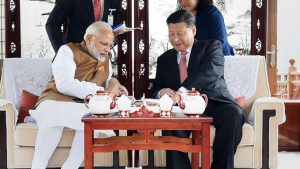
Amid some differences of perception over issues like Kashmir, the Chinese envoy called for a rational approach. “For neighbours and major countries, differences are hard to avoid. The key is to properly handle them,” he said.“We should look at issues with rationality, put them in the bigger picture, reduce differences through consultation, settle disputes through dialogue, promote peace through development, and enhance mutual trust through cooperation. Only by this way can we lead the trend of our times and meet people’s expectations.”
The envoy’s speech laid out a broad canvas for scaling up multi-faceted partnership between China and India ahead of the meeting between Prime Minister Narendra Modi and Chinese President Xi Jinping in India in October. The venue for the summit is yet to be announced, with Mahabalipuram near Chennai widely expected to host the second informal meeting. The other probable venues are Varanasi, Hyderabad and Mumbai.
The first informal summit between PM Modi and President Xi was held in the central Chinese city of Wuhan in April 2018, which culminated in the “Wuhan consensus” for upscaling the India-China partnership in diverse areas.
The first informal summit between PM Modi and President Xi was held in the central Chinese city of Wuhan in April 2018, which culminated in the “Wuhan consensus” for upscaling the India-China partnership in diverse areas.
Alluding to the 70th anniversary of the establishment of diplomatic ties between India and China in 2020, the new envoy said he was ready to work with friends from all walks of life in India to implement the consensus reached by the two leaders, focus on cooperation, seek common development and promote China-India relations to a new height.
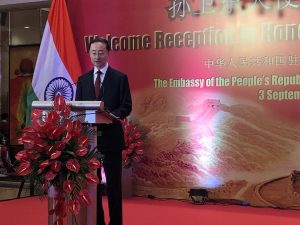
Author Profile

- Manish Chand is Founder-CEO and Editor-in-Chief of India Writes Network (www.indiawrites.org) and India and World, a pioneering magazine focused on international affairs. He is CEO/Director of TGII Media Private Limited, an India-based media, publishing, research and consultancy company.
Latest entries
 India and the WorldApril 21, 20253T Template for India-US Mega Partnership
India and the WorldApril 21, 20253T Template for India-US Mega Partnership India and the WorldFebruary 14, 2025Modi-Trump COMPACT: India, US launch MEGA partnership for 21st century
India and the WorldFebruary 14, 2025Modi-Trump COMPACT: India, US launch MEGA partnership for 21st century India and the WorldJanuary 28, 2025Modi, Trump talk global peace, focus on strategic connect
India and the WorldJanuary 28, 2025Modi, Trump talk global peace, focus on strategic connect India and the WorldDecember 16, 2024Kazan Spirit: India, China SRs to hold talks in Beijing
India and the WorldDecember 16, 2024Kazan Spirit: India, China SRs to hold talks in Beijing





